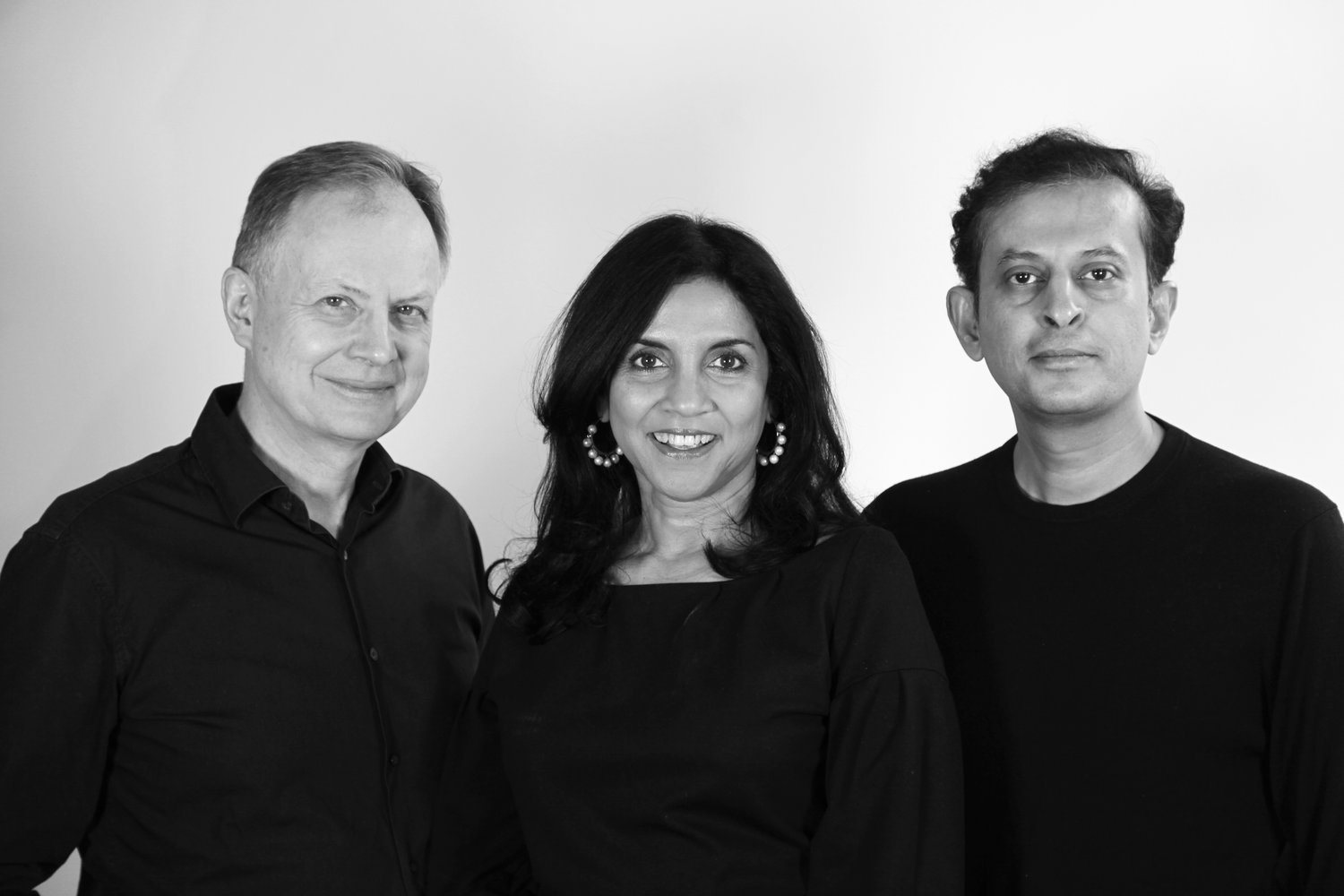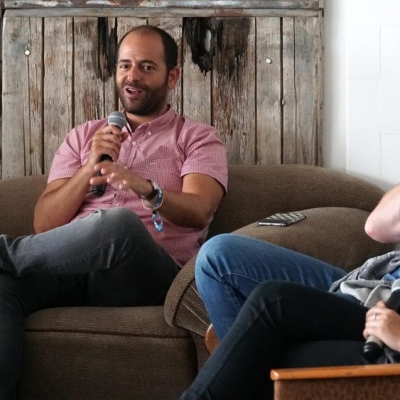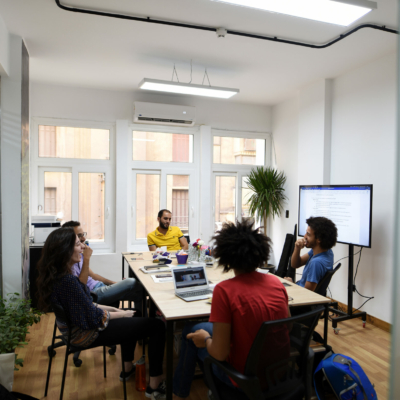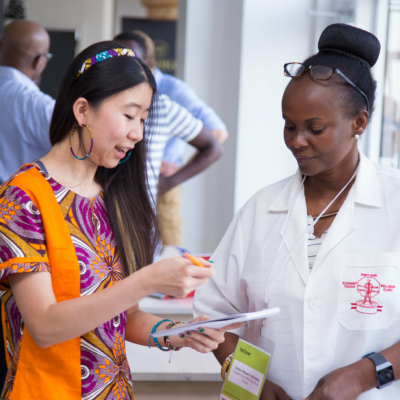
Why You Should Invest in People: Interview with Shoba Purushothaman
We had the honor of chatting with Shoba, Co-Founder of Hardskills, and our enpact alumnus from our AsiaBerlin Delegation Trip in 2019. Usually, we meet up with our entrepreneurs on the ground to hear their story, but this time we decided to give the online format a try. We’re used to all things virtual by now, but we were still a little nervous about the interview; after all, no matter how advanced your zoom set-up is, it still doesn’t compare to grabbing a coffee and recording an interview in a studio set-up, up close and personal.
It turned out to be one of our best founder chats to date.
To say that Shoba is the definition of the resilient entrepreneur in today’s reality would be an understatement. If you’re currently considering starting your own business, already taking the first steps, or even halfway through your journey, you’ll find something in this chat that resonates with you.
enpact: To start off our chat, please tell us a little bit about yourself.
Shoba: I’m an entrepreneur and co-founder of Hardskills. – As a co-founder in an early stage company, I’m involved in multiple areas of the business, but my big focus is responsibility for our customer experience and building our team at Hardskills.
I’ve been an entrepreneur for 20 years, but I started out life as a business journalist in Malaysia, which is where I grew up. I then subsequently left and moved to the west – to the US and then the UK where I really built and developed my professional career. I have lived in seven countries for substantial periods of time. And I feel I’ve developed an intuitive sense of how to move from being an outsider to becoming an insider.
So that’s a little bit about myself.
enpact: You said you started out as a journalist in the media industry. Did that prepare you in any way to become a founder?
Shoba: Actually, it did! A lot of people are surprised, but I do believe journalism is a fantastic foundation for entrepreneurship. I also had the added benefit of having been a business journalist and writing about businesses and business people.
Being able to analyze lots of disparate information and to hone in on what’s relevant. What’s important. This is a key skill, I think, for a founder, because you are trying to make sense of things and being able to meet and talk to people.
Ask questions, be able to make a decision – at some point in journalism, you have to jump. Because you have deadlines, you have to make decisions. And I think that’s also an important skill that I’ve learned, one that is grounded in journalism.
enpact: Your newest venture is called Hardskills, which is an educational platform for developing new skills. What inspired you to found Hardskills?
Shoba: Hardskills is really a natural culmination of all our life and professional experiences as founders. The three of us were founders and experts in media tech. It helped us see how little technology was really being leveraged in – corporate learning.
We wanted to move to a new industry. And the media industry was among the first to get disrupted by digitalization more than 20 years ago. And we lived through that. So we could see around the corner, so to speak, for corporate learning, and we were attracted to bringing our vision and our experience of technology, to bring that disruption to the status quo, into corporate learning.
So that was the motivation: leverage our expertise in a new category.
enpact: We teased a little bit what Hardskills is about, but can you give us a very short rundown of what Hardskills does?
Shoba: Hardskills is a corporate learning platform that focuses on the hard to teach behavioral skills. Skills, such as how to think critically, how to collaborate, how to be inclusive, how to sell an influence.
Today in 2020, these skills are more important than ever for a number of reasons, but the original driver, really, was that as technology moves into every industry, these human skills are becoming more valuable to companies. And today with COVID-19 right in the middle of that world, where lots of people are working from home, working from anywhere, these sorts of day-to-day operating skills are becoming so much more needed and valued both by individuals and by companies.
enpact: Your slogan is “We change mindsets”. Can you explain a little bit what that means?
Shoba: It actually came from our customer base. What we found was that over and over again, there were some common words or phrases that both at the enterprise level and at the learner level people were saying. And a lot of people said, as they go through the three months program: Oh, I changed my mindset. And the other word that they use is that it’s been eye-opening.
So we use both of these words quite a bit. And that’s what behavioral skills is about. We grow up, we have decades of biases by the time we enter the workforce, and those get reinforced or new biases creep in.
I help companies provide some guide rails for their teams. It’s team-based learning, and they will learn new behaviors, new ways of thinking and open up their mindsets to change what needs to get changed – because change is hard.
enpact: You mentioned that you founded Hardskills with two co-founders. How important do you think is it to find the right co-founders at the start for the success of a startup?
Shoba: I cannot imagine being a sole founder, particularly today. In fact, the one piece of advice that I would give entrepreneurs is to really invest the time to find the right co-founders and to do this early on in the journey, because I think it’s important for founders and the founder dynamic to develop and grow together, as a team.
If you want to really build a scalable global brand and business, I think it’s virtually impossible today to do it all alone. Pace of business is so fast and there’s so much to do.
Then we also have a global pandemic going on, which does make things harder. A lot of businesses obviously have been impacted severely by the Corona pandemic.
enpact: How has it been for Hardskills? Is your business growing? Because most B2B companies are seeing the need for the employees to learn these kinds of things.
Shoba: We’ve seen a positive COVID bump and we are very grateful to be in a good position and it’s been a phenomenally exciting year for us. It was always going to be a big year because we are at that phase where every year is a big year, but really, it has just been a phenomenal tailwind.
The biggest impact really is the impact that we’re able to have at this time, because we are both finding professionals who have worked successfully throughout their lives. And those who have always struggled a bit. Both ends of the spectrum are really needing help now.
And we are finding that the very skills that we train, such as how to be effective in virtual meetings, how to influence when you don’t have power, how to read a room when you’re not in it, how to plan, how to be agile; all of these are so valuable today that it’s been incredibly gratifying to get the feedback from learners. Our Net Promoter Score (NPS), which was 60 pre-COVID-19, has shot up to 74.
That is a really good indicator because every learner counts for that net promoter score and the general learning and development industry has a net promoter score of minus 25.
I think a lot of our success is really the content, the subject matter that we cover.
enpact: That sounds absolutely amazing. So taking all that into account, what are your future plans? Where’s the road leading for Hardskills?
Shoba: We are believers in having some fun, and having goals. Even pre-COVID-19, our goal for 2020 was to scale our initial early customer base.
We’ve only had a commercial product in the market for just over a year. So 2020 was meant to be the first full year of having a full product in the market. And our goal had been to get 10 big enterprise clients. We’re ending the year with more than that. – We’ll probably add several more before December 31st comes around.
Where we’re heading with Hardskills in the immediate future is to expand our team, to triple our customer base and roll out a new product. We’ve seen a lot of demand for more products, and we’ve already launched a work from home product in May.
enpact: You mentioned you’re expanding your team. And I do imagine that despite the growth that you have experienced that there are still some challenges of course, with the Corona pandemic, especially when it comes to hiring. How are you handling that? How do you find talent and how do you onboard people?
Shoba: There’s a first time for everything! Although we’ve always been a virtual team – we have team members all over the world, from Australia to the US.
Our business is a digital business. We as founders had- always met in person somebody we were going to hire, and we hire quite differently.
I think compared to many startups, we are very deliberate in the process. We have a six-stage process for hiring and all three founders are involved in adding to the team. It’s still a small team, we’re fewer than 20 people. So it’s important for us to select who we bring into the team. We have hired six people virtually this year.
That has been a new experience and we’ve onboarded them largely virtually too. There were pockets of time where some of them were able to come into the office and be part of the team, but largely it’s virtual. Our worries were really in our mind, but once we did it, it worked. We have found people through referrals and then through online recruiting.
enpact: You’re a very experienced entrepreneur, so you know how to handle a lot more situations than an aspiring entrepreneur, somebody who is just starting out. From looking back at all the years you’ve spent as an entrepreneur, if you could summarize one point that would be absolutely instrumental for a new founder – What would that be?
Shoba: Entrepreneurship has glamorous moments, but they’re moments.
A lot of it is really tough “in the trenches” stuff. I think it’s really important to not let jerks and mediocre people get in your way or get you down.
Develop your own methods. A spirit booster and a frame of reference that allows you to shrink the countless shit that happens moments. They too are moments, so move on from those – quickly. Moving on quickly is key. I think this is something that anyone contemplating entrepreneurship needs to develop internally, that should be something that they can turn on. Don’t be reliant on circumstances for your ability to keep going.
enpact: It is also often mentioned for startup founders that networking or a network is absolutely instrumental in getting through these kind of tough phases, such as the pandemic or otherwise. How important was network building or is your network for your success?
Shoba: Networks are critical. The challenge for many people or the mistakes that I see being made is that people don’t understand the true value of a network. A network is only valuable when you give and when you take; and your network requires cultivation. It’s very easy to build a network. You have people with a huge network of followers, but you can buy them. You can do all kinds of things, but really, what you want is a valuable network.
You do have to invest in it, and you have to invest right. You can’t just fake it. I do take care of developing a network. I do believe that it’s important to pay it forward. That’s my style of networking. And I compartmentalize my network into people who I can share things mutually, and people who are nice to have met, but really there isn’t a huge amount of common ground.
To me, the network has been vital. From everything from helping us find employees to investors to clients. I can’t think of any aspect of business-building that hasn’t benefitted from having my network that I have built over the last 20 years and while being a journalist.
Just to go back to an earlier point: journalists are as good as their last source. I think that was the first time where having trained professionally as a journalist helped me as an entrepreneur; it was knowing how to build a network.
enpact: Speaking of networks, you participated in the 2019 Asia Berlin delegation trip, in India. How did this program help you or help Hardskills in your entrepreneurial journey?
Shoba: India was not new to us as founders, in fact we launched our product there first. We were thrilled to be one of the two companies selected by the Berlin Senate.
As it turned out the biggest value of the market access program was timing because both my co-founder Anthony Hayward and me spent November and December of 2019 in Bangalore. We meet a ton of people in a typical year between us. We make 12 trips to India, each of us makes six to eight trips. Anthony’s based in Singapore and I’m in Berlin, and we take turns travelling.
One of us is almost always in India, but with this program we had a concentrated seven week period where we were in Bangalore and traveled around India. And this proved to be watershed for us because of course, January comes around and travel became impossible, but we have been able to build all those relationships that we initiated in that time.
We’ve been able to thrive through this. It has been a really positive experience for us.
enpact: You mentioned that you grew up in Malaysia and lived in seven countries. You have a lot of connections to India, your co-founder sits in Singapore. So you have a very broad understanding of how founding and doing business in different cultures and also countries works.
What would you say is the easiest place to found when grow a startup is in Southeast Asia or is it in Europe nowadays? And what are the differences?
Shoba: I have personally gone through the incorporation process in Singapore, Malaysia, Australia, the US, the UK, India and Germany.
Singapore wins hands down in terms of the mechanics of setting up and running a startup. There is bureaucracy and there are reporting requirements and all of that, but it’s just a lot easier. I think it’s the wrong question in today’s world, because every startup is a global startup.
So we incorporated as a Singapore entity and that’s where we are based, that’s where our IP is held, and we did that because Singapore has strong, good defensible IP laws. And Singapore is in the hub of our target market; Asia and emerging economies. It’s the ease of doing business, all of that, that we founded the company in Singapore, but we are a global company so the incorporation country really doesn’t define the company. For instance, we had a product development team in Berlin from the start.
Berlin was on its way becoming fashionable back then, but it certainly wasn’t making The Economist stories. We got here before it became a hub for venture capital, and we chose Berlin as a product development hub because of access to the right talent pool here.
It’s a phenomenal talent pool for experienced entrepreneurs. Berlin is also the heart of the startup ecosystem in Europe, and Germany was a very important target customer base for us. So that was our intent in coming here.
German companies invest a lot in training. They understand the idea of a skilled workforce and we have some fantastic German customers, SAP being one, DB Schenker being another. It has really worked out for us. Every company is a global company today and you have to make a decision based on: what is your strategy, what is the end goal? What’s the best thing for you?
We did look at going back to the US to found Hardskills, but it really wasn’t the best position for the mission that we were on because two thirds of the world’s workforce is in emerging economies. So it didn’t make sense to set up in San Francisco, because geographically, we would be so far away from the customer base.
enpact: You mentioned that traditional companies more and more understand the value of the service that you offer. But also self-digitalization, modernization, embracing new kinds of work, and in looking across border. When applying that to German companies, they are not only looking to Europe or to the EU, but they are starting to look east.
What would you recommend German traditional companies to do in regards to Asia? What’s the benefit for them and why should they go there?
Shoba: That’s a great question. One of the surprising things is that when we did the research about setting up in Germany was that our research showed us that German companies, traditional German companies, and “Mittelstand” as well, are actually more penetrated in emerging markets than American or UK companies.
You have tons of engineering companies, mid-sized companies – mid-sized by German terms, but huge by many other measures – which are in Vietnam and Thailand, Indonesia, Malaysia, and India. I mean the German chamber of commerce in India is the most active chamber of commerce outside of Germany.
So that already tells you something about how established German businesses have been across the globe. They’ve been there for decades, but the popular belief is different. If you look at what is reported about in the investor community and in German media, people are always surprised and intrigued.
If I go to a cocktail party or to a networking event and I say our target markets are emerging markets, people look at me like “Oh, but why are you here? And oh, that’s so risky. Why would you do that?” But these are economies where the people are, and it’s growing at 6% to 8% a year. Why wouldn’t you be there?
enpact: I do have one last question. We talked about entrepreneurship and maybe even the glamor of entrepreneurship. If you were to summarize all of your experiences as an entrepreneur, is it all worth it?
Shoba: Oh, absolutely. No question at all.
I think the gratification and being responsible for that gratification is fantastic. As I’ve been saying for a long time, as an entrepreneur, the one thing I’m happy to give time to is to promote entrepreneurship, especially as a path for women.
I believe wholeheartedly that entrepreneurship gives women unbelievable leverage over their own destiny. There is the idea that it takes over your life and it’s much better to just get a paycheck every month. But as an entrepreneur, you set the rules, you can decide what you want to do.
I am very grateful that my co-founder Anthony Hayward persuaded me to give up, as he calls it, my glittering career at a Dow Jones – to come join him on the entrepreneurial journey. It is one of the best decisions I have ever made.
It’s the 2020 Indo-German Startup Week; you can now tune in and hear from Shoba Purushothaman, co-founder of Hardskills, about their experience with the first Soft-Landing program between Germany and India and scaling up by leveraging the Germany – India corridor.



